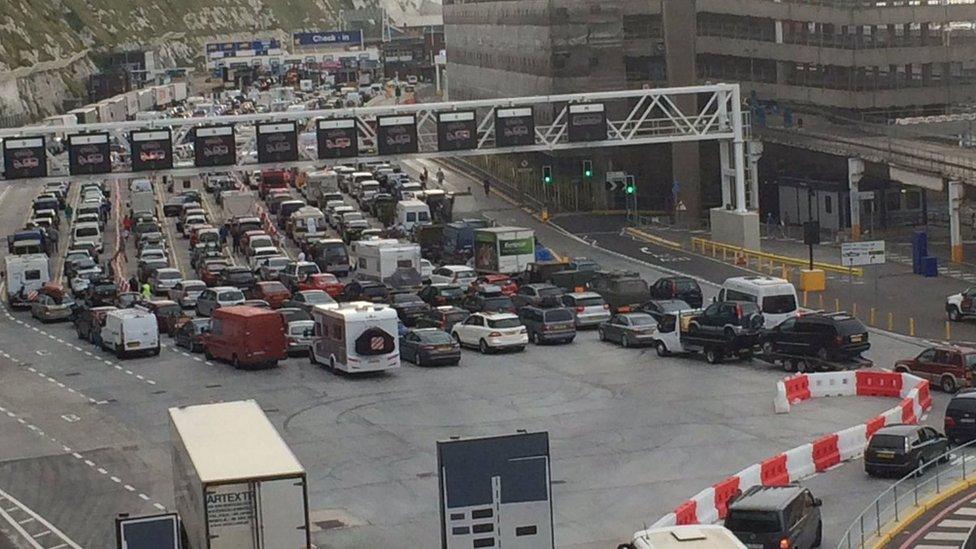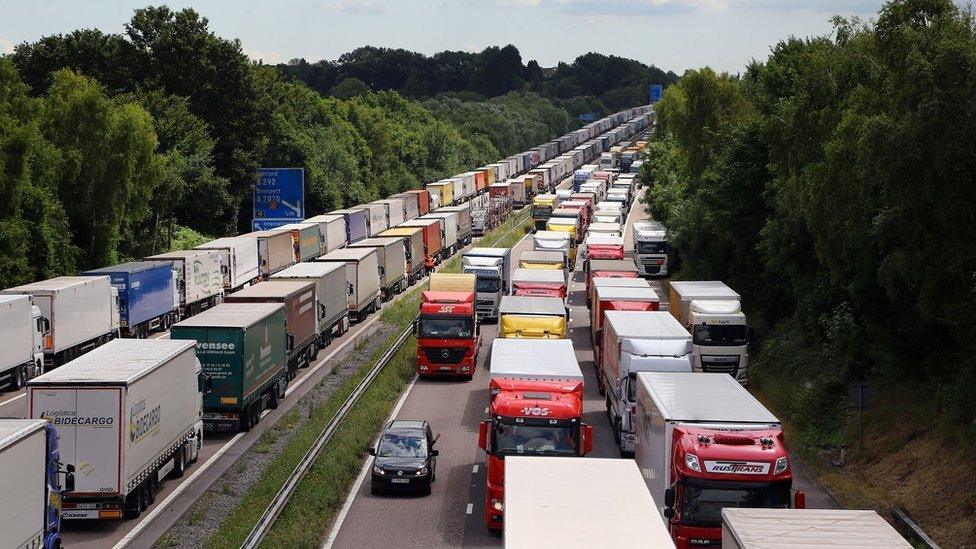Brexit: Back-to-school exam papers are marked
- Published
- comments

Traffic queues at the port of Dover in 2016
Exam results are out next week and there is a decidedly back-to-school feel about the papers the government is publishing this week on Brexit.
Theresa May is back from her holidays and the cabinet is keen to show that it has been hard at work in her absence, not fighting with each other at all.
I will leave it to my political colleagues to assess the substance and significance of Liam Fox and Phillip Hammond shaking hands in front of the whole class, and confine my efforts to marking their Brexit homework.
The first paper they have submitted is on the customs union. This is a special club for EU members that allows them to move goods in and out of each others' countries without having to show special ID or empty their pockets (or trucks) at the door.
Containers roll on and roll off at both ends with zero hassle.
Many businesses and port authorities are worried that leaving the club will mean people are stopped at the border and that these delays will cause long backlogs, interrupt supply chains, increase costs and deter trade.
As the head of the port of Dover has put it: "If we don't get this right, we could face Operation Stack every day in perpetuity."
The answers to these customs questions are therefore important.
Are we leaving the customs union?
Yes and no.
The government document is very clear that the UK will leave the customs union at the end of March 2019. The UK will then seek to agree an "interim period".
So what will that look like? There is a big clue in today's paper.
The government is promising that businesses will only have to adjust once to our eventual customs relationship with the EU.

Lorries pack the M20 motorway in Kent during Operation Stack in 2015
That must mean that the day after we leave the EU, and enter the interim period, there will be no change.
So we are out of the customs union, but everything will pretty much stay the same until the interim period is over.
The only difference is that because we are technically out of the customs union, we will be able to negotiate our own trade deals with non-EU countries, while enjoying the benefits of frictionless trade we have now.
This approach will look to many like the "having our cake and eating it" that Boris Johnson was so keen on - and EU officials weren't.
How long will this interim period last?
The cabinet now seems united that this interim period is finite.
The time limit appears to be the next election in 2022.
So what happens then? There are two answers.
First answer: a brand new "streamlined" customs border with the EU.
Some combination of technology, negotiation, unilateral rule changes would make for a whizzy low-friction border.
Many will say that even if this new system works, it will find it hard to beat what we have now.
Others will say that a tiny bit of extra work at the border is a price worth paying for freedom to cut new trade deals.
Second answer: a new partnership based on a "shared approach" that would remove the need for a customs border altogether.
That option has most experts scratching their heads.
Whatever it is, it does not exist between the EU and anyone else right now (with the possible exception in a limited way of Turkey), and so is hard to analyse.
Show of unity
Overall, what we learn from this document is that the government wants to leave the customs union, while leaving border arrangements identical for up to five years from now.
After March 2019, it hopes to negotiate new trade deals, and there is nothing in reality to stop Liam Fox warming relations with prospective partners right now.
What is still hard to see is how substantive those negotiations with third parties can really be when we, and they, still have no idea what our future relationship will be with the EU.
The government is clearly trying to show the UK and the EU that it is getting its act together with these papers and I'm told this show of unity and effort will be welcomed by business.
But it's worth remembering Liam Fox has always been clear that, in his mind at least, an interim agreement means a period of time to adjust from A to B - where B is known and understood by both parties. It is NOT an extra three years to figure out where B might be.
The time available to define B - namely, the wider issues such as the financial settlement, trade, tariffs, immigration and rights of EU citizens in the UK and vice versa - continues to tick down.